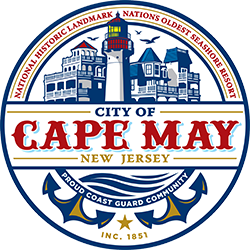The HPC is a seven-member commission of the City of Cape May, established under the Municipal Land Use Law of New Jersey and appointed by the Mayor. The board is charged with working with and advising the City Council, The Planning Board, the Zoning Board of Adjustment and the Construction Official. The HPC’s responsibilities include considering the appropriateness of new development, external modifications to existing structures and any demolition within the Historic District. It also conducts surveys of buildings and sites within the Historic Landmark District and recommends the designation of Historic Districts, buildings and sites to the Cape May City Council.
The HPC consists of seven regular members who serve four-year terms and two alternate members who serve two-year terms. The members are appointed by the Mayor, and fall into the following classes:
- Class A: A person who is knowledgeable in building design and construction or architectural history.
- Class B: A person who is knowledgeable or who has interest in local history.
- Class C: A person who is a resident of the city and holds no other municipal office, position or employment except for membership on the Planning Board or the Zoning Board of Adjustment. Class C members shall constitute a majority by at least one.
Alternate members: Two alternate members who must qualify as Class C members. Alternate members may participate in all HPC proceedings but may not vote except in the absence or disqualification of a regular member. All members of the HPC volunteer their time freely.
Since Cape May is a composite of architectural styles representing several eras, bringing a wide spectrum of colors used through these periods, the HPC does not rule on exterior color combinations.
No. The HPC has no authority regarding interior renovations.
Each designation is separate and distinct.
A National Historic Landmark designation applies to buildings, sites and districts, sites and districts that meet the Secretary of the Interior’s standards for such designation. Certified Local Government was established by the National Historic Preservation Act of 1966 and is administered by the National Park Service through the state’s Historic Preservation Offices. In New Jersey, Cape May is the only city having the landmark designation, while there are many cities with the CLG status.
CLG enables Cape May to support historic preservation programs through eligibility to apply for matching funds grants.
Landmark status was granted because Cape May is a living document of architectural styles in a seaside resort. While Cape May is noted for its concentration of structures built during the "Victorian Period," this city, like most American cities, was built and rebuilt over many architectural periods, a process that continues today. Throughout the city there are significant styles from all periods.
The simple answer would be to say that it is the law. However, the HPC is charged with applying the various guidelines regarding exterior renovations, development and demolition to ensure that the improvement preserves the integrity of both the structure and the neighborhood. If the improvement is considered to be inappropriate, the HPC will offer suggestions to the owner for a more appropriate way to accomplish the owner’s wishes.
When the owner is contemplating exterior renovations to a property, he or she must consult the City Construction Office in City Hall. At that time, the applicable guidelines will be given to the owner. Manufacturer information for specific restoration or renovation projects is also available in the Construction Office. The owner may also request a meeting with a member of the HPC for informal guidance on a project.
A key structure is a unique architectural structure on an importance example of an architectural period of style. Noted examples are The Mainstay Inn, The Abbey, the Physick House or the properties at 1105 New Jersey Ave. or 1120 New York Ave. Contributing Structures are those whose architecture enhances the neighborhood where they are located but the style is not unique, such as the group of houses on the north side of New York Ave. between Madison and Trenton Aves. (the 1000 and 1100 blocks).
Our initial research has not uncovered any historical designation of a park at that area. We will continue our investigation. If any of our readers can shed any light on this question, please write us in care of the Star and Wave.
In the case of Cape May, site designations are a result of a survey of the Landmark District. The survey team reviews each site in the district, applying the Secretary of the Interior standards for identification and evaluation an the State Historic Preservation Office guidelines for Architectural Survey. After the standards are applied, the corresponding designation is given.
The original surveys were done by teams contracted by the City of Cape May and were chaired by certified Architectural Historians.
Many applications are approved by the construction official if the renovation involves replacing materials in a same for same situation. Applications that are in complete accord with the applicable guideline and have all information required for a decision are often approved in review by a sub-committee of the HPC.
"Same for same" is when the applicant intends to replace a deteriorated material with the same material, ie: the applicant wishes to replace a cedar shingle roof with a cedar shingle roof. This application could be approved by the construction official.

